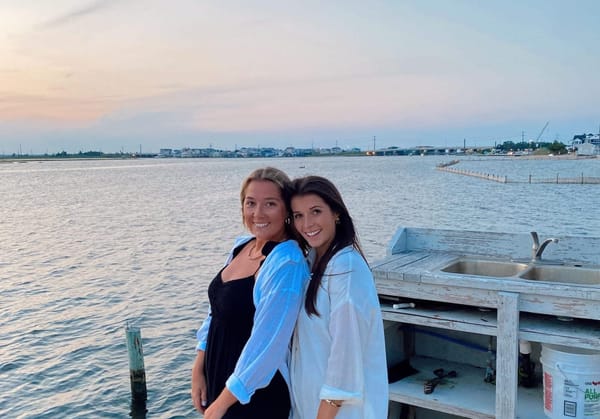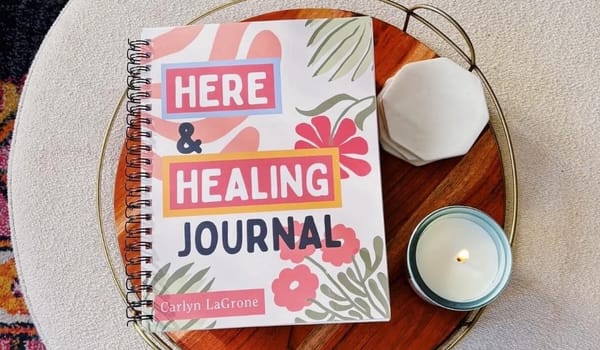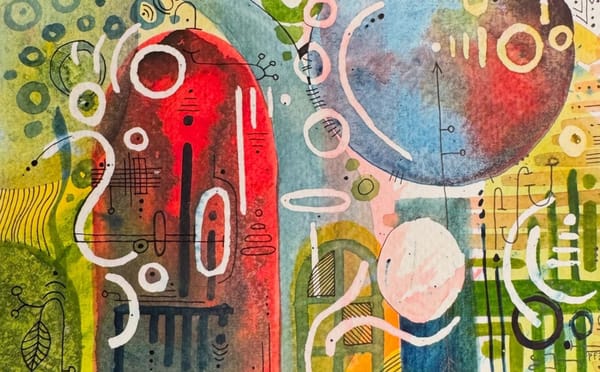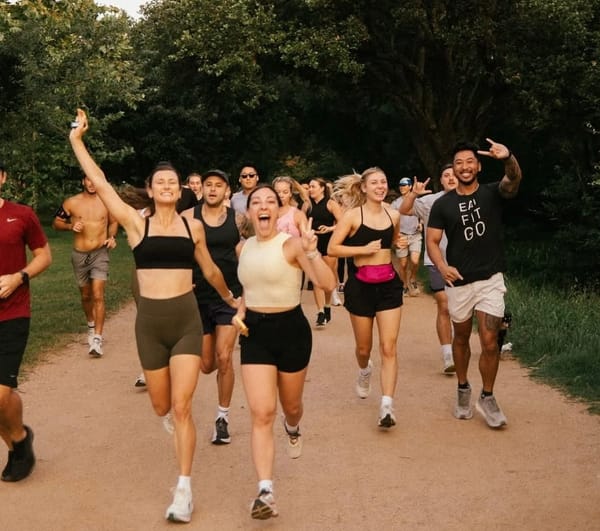A Tribute to Bailey
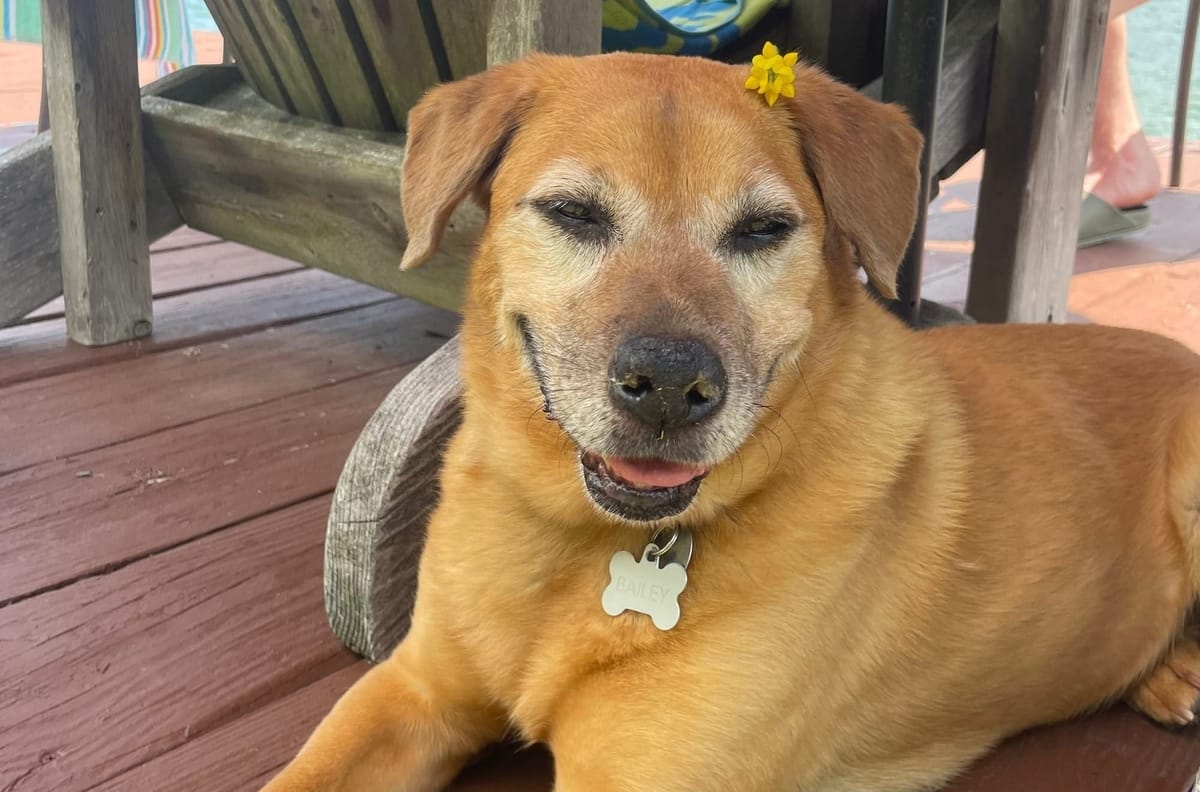
I begged my dad for a dog.
I was in eighth grade. It had been one year since my mom died, and my sister had just left for college. I was suddenly the only child in the house – just me, my dad, and our quiet grief.
At school, I was known as the girl whose mom died of cancer. My mom had been the light of our family – radiant, loud, and full of life. When she died, everything dimmed.
After my mom passed, everything felt awkward and heavy. Through the chaos of middle school and the weight of grief, I became convinced that one thing could make life better: a dog. We already had Stella, a sweet old dog, but I felt we needed a puppy in our lives.
Convincing my dad became my new obsession. I made presentations and slide decks about different breeds and why we needed one.
At the time, I was also in rec-league soccer. It was mostly an excuse to hang out with friends on a weeknight – sitting on the grass, talking on the field instead of practicing, then heading to Maggie Moo’s afterward for my usual: blue cotton candy ice cream with gummy bears and marshmallow sauce.
After many “no’s”, my dad finally gave in – but with a catch. On our way home from a Sunday game, he said, “I’ll get you a dog if you score two goals in one game.”
To most players, that might’ve sounded doable. But to me, it was a trick. I’d never scored a goal once in my eight years of playing. I avoided being put in games altogether, preferring to chat from the sidelines and eat Goldfish.
This changed the game. I was determined, and I could already picture my dog. I had a list of names on my phone and a folder of breeds saved to my computer. That Wednesday, I announced to my teammates and coaches that my dad had promised me a dog if I scored two goals. My coaches laughed but agreed to help me improve, and my teammates were excited.
For the first time that year, I wasn’t just the girl whose mom died. I was the girl who wanted a dog.
That Sunday, I showed up ready to score. My coaches started me in the first line of players, and my teammate passed me the ball. I sprinted down the field, took a shot... and sent a perfect pass straight to the other team’s goalie.
They kept passing to me, but every attempt ended the same way: a missed shot or a panicked retreat whenever taller defenders charged at me in a herd.
Each week, I’d walk off the field defeated, silent in the car while my dad drove me home. “At least you’re actually shooting now!” he’d say.
Even though my teammates kept passing me the ball, I still couldn’t score.
I grew desperate as the season went on. Before each match, when the teams lined up to shake hands, I’d whisper to my opponents, “Can you please let me score? I can get a dog if I do.” They’d furrow their brows and shake their heads. Shockingly, bribing the other team didn’t work.
On the last game of the season, I had an extra buzz running through me. This was my last chance.
In the first few plays of the game, I yelled for the ball. I was standing right by the goal. But instead of aiming for the net, the strongest girl on our team pivoted and fired straight at me. It was meant as a pass, but the ball came roaring toward my face, knocking me onto my back.
I got up, dizzy with my face throbbing, ready to keep playing – until I looked down and saw drops of blood on the grass. My nose was bleeding.
Out of shock at my first injury-induced nosebleed, I sat down and cried on the field. The ref paused the game and helped me off. I sat on the sidelines with ice on my face, my spirit deflated. I watched as our team kept losing points, exhausted and defeated like me.
In the last few minutes, with the score 7–6, I looked at my coach. “Put me in.” He hesitated. “Are you sure?”
I nodded and ran onto the field, equally determined and terrified of the ball. My teammates were focused on winning, and after a season of missed shots, they weren’t passing to me.
In the final seconds of the game, as one of them drove the ball down the field toward our goal, I shouted, “HEY! PASS TO ME!” I got the ball, pivoted, and kicked with everything I had.
The ball flew into the goal just as the whistle blew, tying the game.
My teammates and coaches screamed. They ran to me, hugged me, and lifted me off the ground. The other team looked visibly confused at why we were so excited to have tied.
When I walked off the field, my coach turned to my dad and said, “I think you at least owe her half a dog.”
The next weekend, my dad and I went to the shelter.
From the room of squirming dogs, one froze and stared at me with timid, sweet eyes. I asked if I could play with her. Her soft, doe-eyed face stood out to me. She was hesitant at first, but after a few minutes, she curled up in my lap and rested her head on my legs.
We learned she and her siblings had been abandoned on a farm, surviving off acorns. We visited other shelters that day, but before heading home, I said, “Maybe we should go back to the APA – just to see that one dog again.”
When we walked in, she had that same sweet look. She began following me around the room as if I was already her person, sniffing my face. We took her home.
From the list of names I’d made over months, none felt right. She was entirely different from the breeds I’d researched – soft, golden, a little mutt, somewhere between a beagle and a ridgeback. She was definitely too big to hold, but she let you place her on your lap, contorting her body to sit like a human.
“How about Bailey?” my dad said.
Bailey was a gift. She softened the edges of our grief. When my siblings came home from college, instead of a house filled only with memories of cancer and loss, there was laughter and happiness again. “Look what Bailey’s doing now!” became the most common phrase in our home. She glued us back together.
As I grew older, through the mess of middle school, the heaviness of high school, and the changes of college, Bailey was always there.
During my senior year of college, after a mental breakdown, my dad drove eight hours to pick me up. Bailey rode along, and the second she showed up on my doorstep with her tail wagging, I felt a little better.
She was a constant source of comfort, those same dopey, gentle eyes from the shelter always remaining. She rarely barked and had no interest in fetch or getting her paws wet, but she loved howling at sirens and making cat-like noises whenever she got excited.
She remained a medium-sized dog who somehow seemed meant to grow bigger – soft and endlessly puppy-like, even as gray hairs grew in around her eyes and snout.
To Bailey – the gift who brought warmth and sweetness to the dark moments of our grief – thank you for returning light to our family when we needed it most.

